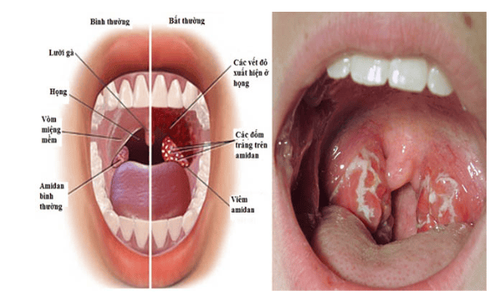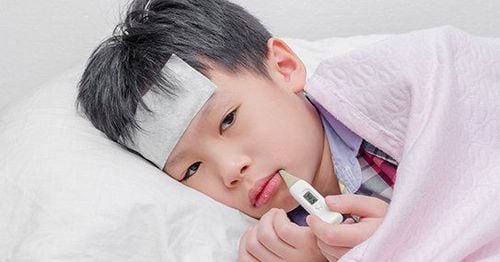This is an automatically translated article.
The article was professionally consulted by Specialist Doctor II Le Thanh Cam - Pediatrician - Pediatrics - Neonatology Department - Vinmec Danang International General Hospital. Dr. Cam has 15 years of experience in the diagnosis & treatment of pediatric diseases. He used to work at the Department of Pediatrics - Da Nang Hospital and Da Nang Center for Obstetrics and Gynecology. His strength is in the diagnosis and treatment of pediatric pathologies, resuscitation, pediatric emergency.Tonsillitis is a disease that can appear in anyone, but is common in children. Although the disease is simple, if not treated in time, the disease can cause dangerous complications for the patient. Although tonsillitis is a common disease, not everyone understands this disease.
1. What is tonsil? The role of tonsils in the body
The tonsils are lymphoid organizations located inside the pharynx, including: palatal tonsils, lingual tonsils, tonsils, and tonsils, forming a ring around the inside of the throat called Waldeyer's ring. In which, the palatine tonsils are the largest, located on both sides of the throat wall, and are also the most commonly inflamed tonsils.
The tonsils play an important role that is to protect the body against the invasion and attack of pathogens (bacteria, viruses) through local immune activity. At the same time, the tonsils also secrete natural antibodies to fight infection.
2. Tonsillitis
2.1. What is tonsillitis?
When the number of viruses or bacteria exceeds the allowed level, massively entering the body, making the tonsils unable to resist, this is the time when tonsillitis appears. When the tonsils become inflamed repeatedly, its ability to fight bacteria and viruses will weaken. At this time, it is the inflammatory foci in the tonsils that become the starting point of episodes of pharyngitis.

Acute tonsillitis: Is when the tonsils are infected by a virus or bacteria, causing the tonsils to become red and swollen and cause a very uncomfortable burning pain in the throat. Chronic tonsillitis: Is a condition in which the tonsils cannot circulate, accumulate bacteria and viruses, create conditions for pathogens to develop, causing severe damage to the tonsils, frequent inflammation of the tonsils, and inflammation of the tonsils. many times again. Chronic tonsillitis is further divided into 2 types: Hyper-inflammatory type: Inflammatory tonsils grow larger, this form is common in children or young people. Atrophic sclerosis: The tonsils shrink.
2.2. Why do children often get tonsillitis?
Children are the most common subjects with tonsillitis. The cause of this condition is that the immune activity of the tonsils is strongest in the group of children from 4 to 10 years old, after which it will decrease markedly. Especially with frequent cases of recurrent tonsillitis, when children > 10 years old, tonsillitis will decrease.
2.3. How to recognize a child with tonsillitis?
There are many types of viruses and bacteria that cause tonsillitis, depending on the causative agent, the child will have its own characteristic symptoms. However, the child's symptoms when the tonsils are inflamed are as follows:
The child has a fever, usually a high fever. When swallowing feels stuck, swallowing painful. Children are tired, have headaches, loss of appetite,.. Children may have a cough. When examining, the doctor can see the tonsils are swollen, red, may be pus, pseudomembranous, ulcerated or not, ...
2.4 How will the child's health be affected when the tonsils are often inflamed or too large?
When the tonsils are often infected, it will reduce the health of the child and can lead to many complications such as:
Abscess around the tonsils. Throat abscess. Infection of the back of the throat. Arthritis. Glomerulonephritis. Myocarditis. When the tonsils are too large, they will block the airways, affecting the baby's breathing process. At that time, the child will have symptoms such as shortness of breath, snoring, and may even have pauses in breathing during sleep. This will lead to a prolonged lack of oxygen that affects many other organs such as the heart, nerves, abnormal craniofacial development,...
2.5. When to remove tonsils for children?

Excessive tonsils causing obstruction of the child's airway. The child stops breathing during sleep. Children with sleep disorders. Children with complications on heart organs, kidneys, joints, lungs. Children have difficulty eating and swallowing. Children with abnormal growth in the craniofacial region. Children with recurrent tonsillitis more than 3 times/year, Children with abscesses around the tonsils. The child's bad breath persists despite appropriate treatment and other causes of bad breath have been ruled out. Children with tonsillitis often accompanied by slow or no weight gain. The child has unilateral enlarged tonsils and is suspected of having cancer.
The tonsils are lymphoid tissues located in the pharynx, which play a role in protecting the body from pathogens. When the attack of pathogens exceeds the resistance of the tonsils, the tonsils become inflamed. Tonsillitis is common in children because this is the age when the tonsils are most active and most susceptible to inflammation. Although the tonsils have a protective role in the body, when that ability is no longer available or the tonsils adversely affect health, they need to be removed.
To protect children from agents that affect their health, you need to monitor and take them to a doctor when there are abnormal symptoms.
As a key area of Vinmec Health system, Pediatrics Department always brings satisfaction to customers and is highly appreciated by industry experts with:
Gathering a team of top doctors and nurses in Pediatrics : Including leading experts with high professional qualifications (professor, associate professor, doctorate, master), rich experience, worked in big hospitals such as Bach Mai, 108.. Doctors All doctors are well-trained, professional, conscientious, knowledgeable about young psychology. In addition to domestic pediatric specialists, the Department of Pediatrics also has the participation of foreign experts (Japan, Singapore, Australia, USA) who are always pioneers in applying the latest and most effective treatment regimens. . Comprehensive services: In the field of Pediatrics, Vinmec provides a series of continuous medical examination and treatment services from Newborn to Pediatric and Vaccine,... according to international standards to help parents take care of their baby's health from birth to childhood. from birth to adulthood Specialized techniques: Vinmec has successfully deployed many specialized techniques to make the treatment of difficult diseases in Pediatrics more effective: neurosurgery - skull surgery, stem cell transplantation. blood in cancer treatment. Professional care: In addition to understanding children's psychology, Vinmec also pays special attention to the children's play space, helping them to have fun and get used to the hospital's environment, cooperate in treatment, improve the efficiency of medical treatment.
Please dial HOTLINE for more information or register for an appointment HERE. Download MyVinmec app to make appointments faster and to manage your bookings easily.














